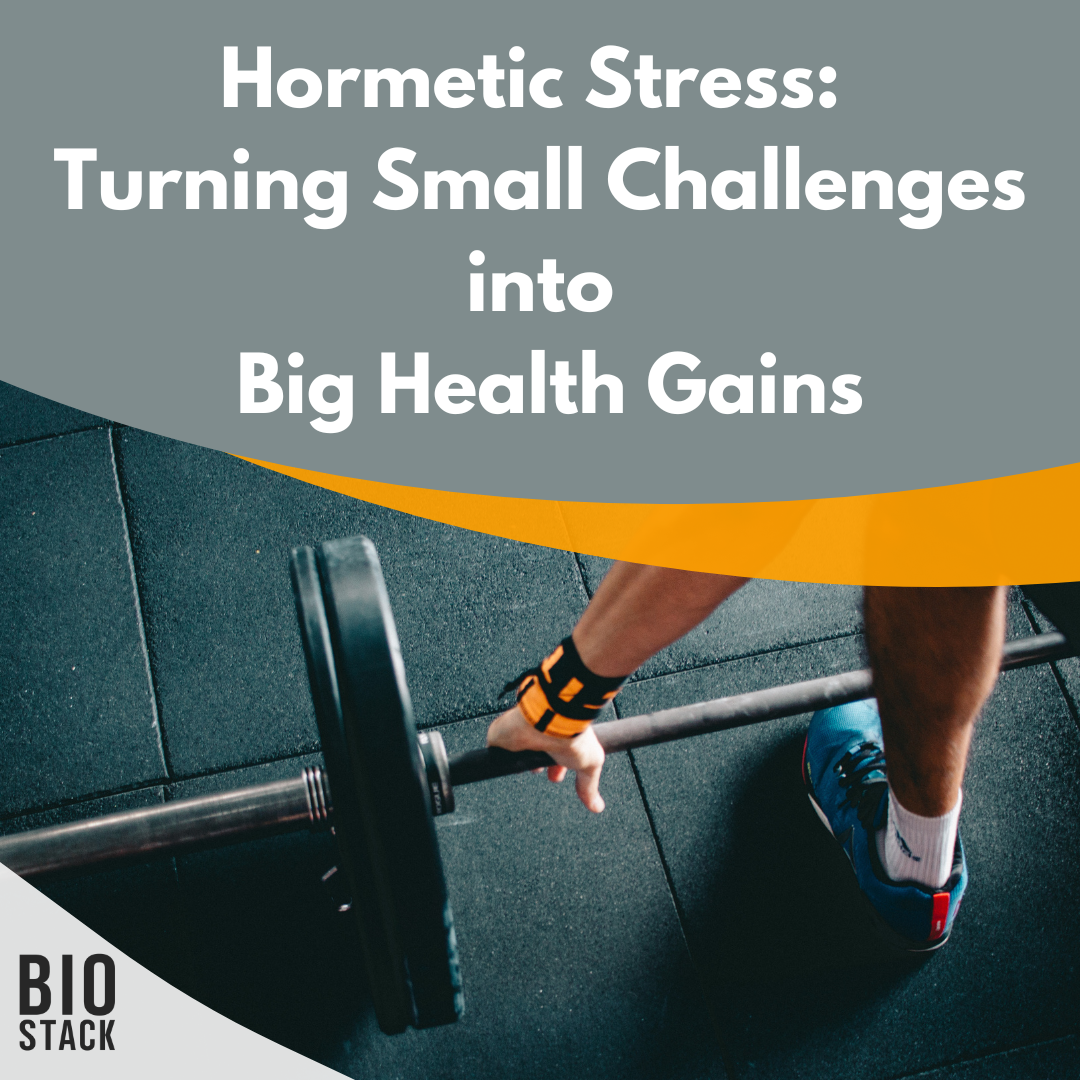
Hormetic Stress: Turning Small Challenges into Big Health Gains
Share
Hormetic Stress: Turning Small Challenges into Big Health Gains
Stress often gets a bad reputation. We hear about the harmful effects of chronic stress—burnout, inflammation, and illness—and we’re told to avoid it at all costs. But what if a certain type of stress could make us stronger, healthier, and more resilient? Enter hormetic stress: a fascinating biological principle where small doses of stress trigger adaptive responses that benefit our health and well-being.
In this blog, we’ll dive into what hormetic stress is, how it works, and how you can incorporate simple stressors into your life to boost your vitality, resilience, and longevity.
What is Hormetic Stress?
Hormetic stress, often referred to as hormesis, is the process where a low dose of a stressor stimulates a beneficial adaptive response in the body. Think of it as a "what doesn’t kill you makes you stronger" scenario, but on a cellular level. Small amounts of controlled stress push your body to adapt and build resilience, whereas excessive or chronic stress can overwhelm your system and cause harm.
This principle is at the heart of many well-known health practices: exercise, fasting, exposure to heat and cold, and even certain plant compounds. When done intentionally and in moderation, these stressors challenge your body to improve its defenses, repair mechanisms, and overall function.
Hormesis is the reason why a little bit of struggle can be a good thing—for your body, mind, and long-term health.
How Does Hormetic Stress Work?
To understand how hormetic stress works, it’s helpful to think about your body’s natural adaptive mechanisms. When exposed to a stressor, your cells trigger responses that aim to repair damage, strengthen systems, and build resilience for future challenges.
This cellular adaptation involves several key processes:
-
Upregulation of Antioxidant Defenses: Hormetic stressors stimulate the production of antioxidants like glutathione and superoxide dismutase (SOD). These antioxidants help neutralize free radicals, protect cells, and reduce oxidative stress.
-
Activation of Heat Shock Proteins (HSPs): HSPs are proteins that repair damaged cells and improve cellular resilience. They are activated by stressors like exercise, heat exposure, and fasting.
-
Mitochondrial Biogenesis: Hormetic stress encourages the production of new mitochondria (your cells’ energy factories), improving energy production and metabolic efficiency.
-
Autophagy: Stressors like fasting and cold exposure stimulate autophagy, a cellular “cleanup” process where damaged proteins and organelles are broken down and recycled, improving cellular health.
By pushing your body out of its comfort zone, hormetic stress essentially teaches it to become more efficient, adaptive, and resilient. The key, however, is balance: stress must be applied in small, manageable doses to reap these benefits.
Examples of Hormetic Stressors
Hormetic stress can take many forms, most of which are simple and accessible. Here are some of the most powerful examples:
1. Exercise
Exercise is perhaps the most well-known hormetic stressor. When you work out, your muscles experience microscopic damage. In response, your body repairs and strengthens them, leading to increased fitness and endurance.
-
Benefits: Improved cardiovascular health, stronger muscles, better metabolism, and reduced risk of chronic disease.
-
Pro Tip: Incorporate a mix of resistance training, cardio, and high-intensity interval training (HIIT) to maximize hormetic benefits.
2. Intermittent Fasting
Fasting introduces metabolic stress, prompting your body to switch to fat for energy and activate cellular repair processes like autophagy.
-
Benefits: Improved insulin sensitivity, weight management, reduced inflammation, and enhanced longevity.
-
Pro Tip: Start with a 12-16 hour fasting window and gradually extend it as your body adapts.
3. Cold Exposure
Deliberate cold exposure, such as cold showers, ice baths, or winter swims, is a powerful hormetic stressor. It stimulates adaptive responses that improve circulation, metabolic function, and mental resilience.
-
Benefits: Boosted energy, reduced inflammation, increased brown fat activation (which burns energy), and improved mood.
-
Pro Tip: Start with 30-second cold showers and work up to longer durations or full cold plunges.
4. Heat Exposure
Heat stress from saunas or hot baths activates heat shock proteins (HSPs), which repair cells and improve cellular resilience.
-
Benefits: Detoxification, improved cardiovascular health, muscle recovery, and longevity.
-
Pro Tip: Aim for 15-20 minutes in a sauna 2-3 times per week for optimal results.
5. Plant Compounds (Phytonutrients)
Certain plant compounds, such as polyphenols, act as mild stressors that stimulate your body’s antioxidant defenses. This process, called xenohormesis, explains the benefits of consuming foods like berries, dark chocolate, turmeric, and green tea.
-
Benefits: Reduced oxidative stress, improved brain function, and lower inflammation.
-
Pro Tip: Include a variety of colorful fruits, vegetables, and spices in your daily diet to maximize phytonutrient intake.
6. Mental and Cognitive Challenges
Pushing your brain to learn new skills, solve problems, or face discomfort can trigger hormesis in the mind.
-
Benefits: Enhanced cognitive resilience, improved focus, and reduced risk of neurodegenerative diseases.
-
Pro Tip: Try activities like learning a new language, playing musical instruments, or solving puzzles.
Why is Hormetic Stress Important for Health and Longevity?
The ability to adapt to small amounts of stress is a hallmark of a resilient and healthy body. Hormetic stress builds stronger cells, tissues, and systems that are better equipped to handle larger challenges over time. Here are some key benefits:
-
Enhanced Cellular Resilience: Hormetic stress strengthens cellular repair mechanisms, reduces damage from oxidative stress, and improves overall function.
-
Improved Mitochondrial Health: Healthy mitochondria are essential for energy production, metabolism, and longevity. Hormesis promotes mitochondrial biogenesis and efficiency.
-
Reduced Inflammation: Many hormetic stressors, like exercise and fasting, reduce systemic inflammation, which is a root cause of chronic diseases.
-
Boosted Brain Health: Hormetic stressors stimulate the production of brain-derived neurotrophic factor (BDNF), a protein that supports brain growth, learning, and cognitive function.
-
Longevity and Anti-Aging: By activating pathways like autophagy and antioxidant defense, hormetic stress slows down cellular aging and extends healthspan.
How to Incorporate Hormetic Stress into Your Life
The beauty of hormetic stress is that it doesn’t require extreme measures. Small, consistent doses of controlled stressors can lead to powerful adaptations over time. Here’s how to get started:
-
Start Small and Build Up:
-
Take short cold showers or incorporate short fasting periods into your day.
-
Begin with 10-15 minutes of exercise or exposure to a new stressor and gradually increase intensity or duration.
-
-
Embrace Variety:
-
Alternate between different hormetic stressors, such as exercise, heat exposure, fasting, and mental challenges.
-
This approach ensures your body doesn’t adapt too quickly and keeps the benefits coming.
-
-
Listen to Your Body:
-
Hormetic stress works best when applied in moderation. Overdoing it can lead to chronic stress, injury, or burnout.
-
If you feel fatigued or overwhelmed, allow for rest and recovery.
-
-
Make it a Lifestyle:
-
Consistency is key. Build hormetic stressors into your daily or weekly routine to create sustainable habits that strengthen your body and mind over time.
-
Final Thoughts: Small Challenges, Big Rewards
Hormetic stress is a reminder that not all stress is harmful. In fact, small doses of the right kind of stress can unlock profound health benefits, making you stronger, healthier, and more resilient. By intentionally introducing hormetic stressors like exercise, fasting, cold exposure, and mental challenges, you can harness your body’s natural adaptive mechanisms to thrive.
So, embrace the discomfort. Take that cold shower, push through a challenging workout, and fast for a few hours longer. Remember, it’s these small, manageable challenges that teach your body to adapt, grow, and ultimately achieve greater health and longevity.
The path to resilience begins with a single step outside your comfort zone—are you ready to take it?
